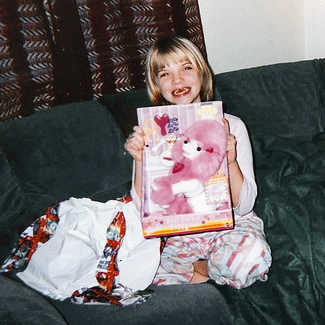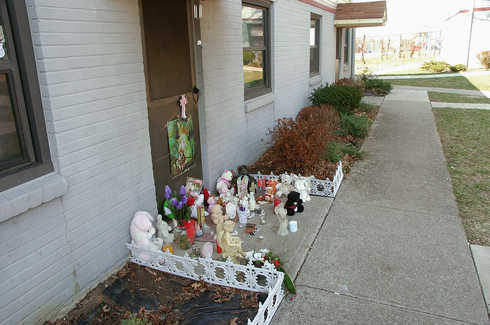Michaela's life began with promise, as does every child's. She was the daughter of Rachel Woodrum Samuels and Patrick Watkins and spent her early years experiencing the typical joys and challenges of childhood. Michaela attended Shearer Elementary School and was known to attend Porter Memorial Baptist Church in Lexington, indicating a life that, on the surface, seemed ordinary. However, beneath this veneer of normalcy, Michaela's life was anything but.
Her parents, Rachel and Patrick, endured a tumultuous relationship, leading to their separation. The divorce documents cited incidents of domestic violence, painting a picture of a household fraught with tension and fear. It's crucial to recognize that domestic violence is not just an issue between adults; it deeply affects the children in the household, often in ways that are not immediately visible.
Michaela's journey took a dramatic turn when she was removed from her mother's care due to allegations of neglect. She briefly entered foster care, a system designed to protect children, yet sometimes fails to offer the sanctuary they need. Michaela's eventual placement with her father, Patrick, and stepmother, Joy, despite their known history of domestic disputes, was a decision that would have dire consequences.
In school, Michaela was described as an "overachiever," a child who sought the approval and affection of her teachers – perhaps a reflection of what she was missing at home. Her teachers remembered her as a sweet and loving child, a stark contrast to the environment she returned to each day. The decision by Patrick and Joy to withdraw Michaela from school for homeschooling marked the beginning of her isolation from a world that could have offered her support and love.
Reports from neighbors and family members painted a harrowing picture of Michaela's life with Patrick and Joy. The abuse, both verbal and physical, was not hidden from the world; it was simply ignored or overlooked by those who could have intervened. The decision to homeschool her further isolated Michaela, cutting her off from the few safe havens she had.
The most tragic aspect of Michaela's story is the systemic failure at multiple levels. Despite visible signs of abuse and neglect, interventions were minimal and ineffective. The decision by social services to keep her in the home, even after reports from concerned relatives and neighbors, highlights a broken system that often fails to protect the most vulnerable.
Michaela's life came to a tragic end on March 11, 2007. The details surrounding her death are a stark reminder of the worst forms of child abuse. The injuries she sustained were not just physical but also emotional, stripping her of her dignity and humanity in her final days.
We remember Michaela not just for the tragic circumstances of her death but for the life she lived and the joy she brought to those who truly knew her. Her story is a call to action, a reminder of the work that still needs to be done to protect children like her. It's a plea to not turn a blind eye to the suffering of others, to be the voice for those who cannot speak for themselves.
In the wake of Michaela's death, it's essential to advocate for stronger protective measures for children and more effective interventions in cases of domestic violence. Her story should be a catalyst for change, for a system that prioritizes the welfare of the child above all else.
Michaela Sue Watkins' life was a tapestry of bright moments overshadowed by darkness. In her memory, let us strive to be the light that she so desperately needed. Let's ensure that her legacy is not one of sorrow, but of change, hope, and a world that does better for its children.
Written by: Alan Owen
Michaela's life began with promise, as does every child's. She was the daughter of Rachel Woodrum Samuels and Patrick Watkins and spent her early years experiencing the typical joys and challenges of childhood. Michaela attended Shearer Elementary School and was known to attend Porter Memorial Baptist Church in Lexington, indicating a life that, on the surface, seemed ordinary. However, beneath this veneer of normalcy, Michaela's life was anything but.
Her parents, Rachel and Patrick, endured a tumultuous relationship, leading to their separation. The divorce documents cited incidents of domestic violence, painting a picture of a household fraught with tension and fear. It's crucial to recognize that domestic violence is not just an issue between adults; it deeply affects the children in the household, often in ways that are not immediately visible.
Michaela's journey took a dramatic turn when she was removed from her mother's care due to allegations of neglect. She briefly entered foster care, a system designed to protect children, yet sometimes fails to offer the sanctuary they need. Michaela's eventual placement with her father, Patrick, and stepmother, Joy, despite their known history of domestic disputes, was a decision that would have dire consequences.
In school, Michaela was described as an "overachiever," a child who sought the approval and affection of her teachers – perhaps a reflection of what she was missing at home. Her teachers remembered her as a sweet and loving child, a stark contrast to the environment she returned to each day. The decision by Patrick and Joy to withdraw Michaela from school for homeschooling marked the beginning of her isolation from a world that could have offered her support and love.
Reports from neighbors and family members painted a harrowing picture of Michaela's life with Patrick and Joy. The abuse, both verbal and physical, was not hidden from the world; it was simply ignored or overlooked by those who could have intervened. The decision to homeschool her further isolated Michaela, cutting her off from the few safe havens she had.
The most tragic aspect of Michaela's story is the systemic failure at multiple levels. Despite visible signs of abuse and neglect, interventions were minimal and ineffective. The decision by social services to keep her in the home, even after reports from concerned relatives and neighbors, highlights a broken system that often fails to protect the most vulnerable.
Michaela's life came to a tragic end on March 11, 2007. The details surrounding her death are a stark reminder of the worst forms of child abuse. The injuries she sustained were not just physical but also emotional, stripping her of her dignity and humanity in her final days.
We remember Michaela not just for the tragic circumstances of her death but for the life she lived and the joy she brought to those who truly knew her. Her story is a call to action, a reminder of the work that still needs to be done to protect children like her. It's a plea to not turn a blind eye to the suffering of others, to be the voice for those who cannot speak for themselves.
In the wake of Michaela's death, it's essential to advocate for stronger protective measures for children and more effective interventions in cases of domestic violence. Her story should be a catalyst for change, for a system that prioritizes the welfare of the child above all else.
Michaela Sue Watkins' life was a tapestry of bright moments overshadowed by darkness. In her memory, let us strive to be the light that she so desperately needed. Let's ensure that her legacy is not one of sorrow, but of change, hope, and a world that does better for its children.
Written by: Alan Owen






